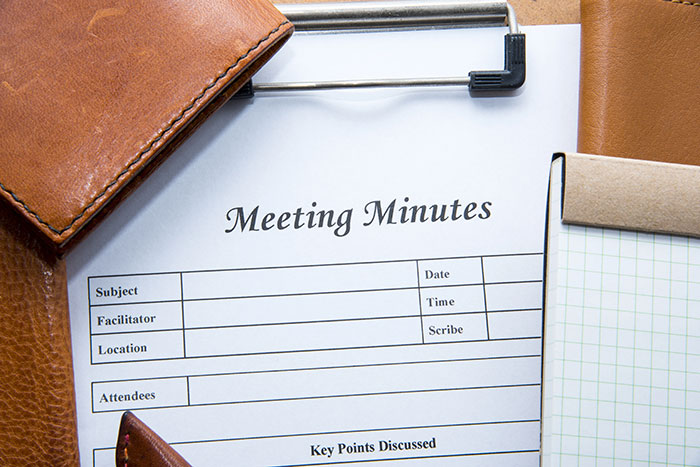A Homeowner's Association (HOA) Meeting Minutes is an official record of what the board members said and did at a particular board meeting. This essential document plays a crucial role in financial affairs and is legally binding- it can be used in a court of law. That means you need to ensure everything in this document is in order.
So, what are some of the dos and don'ts when preparing your HOA's Meeting Minutes? Read on:
The Dos
Here are some of the things to do when recording your board meeting minutes:
Comply with the governing laws and documents when taking these records, the board secretary, assistant secretary, or appointed recorder must comply with the:
- Federal laws and regulations
- State laws and regulations
- Local laws and regulations
- Governing documents
Be sure you clearly understand what should go into the document, when to avail it to homeowners, and how to store and retrieve it. While HOAs differ, here are the most common items to include:
- The Community Association's name
- Type of meeting: think special, monthly, and annual
- Meeting Location
- Meeting Date
- Prior meeting's approval
- Members reports
- The time it was called to order and adjourned
- Discussions
- All motions and actions taken
- Names of voters: proponents, opponents, and those who abstained
- Present and absent members and positions
- Financial transactions: bank account activities, reserve costs, etc.
Robust minutes reflect actions concisely. So ensure you keep things short and sweet and throw confusion out of the window. That way, the board will act on the minutes seamlessly, and members will enjoy going through them and look forward to attending more meetings.
So, what's the pro tip here? Use a template or the meeting agenda to guide you, and try not to go beyond two pages.
- Ensure they're acceptable for every party to readMinutes aren't meant for only board members and residents. Outside parties like bankers, mortgage firms, realtors, and others will want to peruse them.
Be sure you'll be comfortable when these people start going through the document. Here are our best tricks:
- Avoid sensitive and personal details.
- Make them easy-to-grasp
- Format the minutes correctly
- Proofread to eliminate any spelling and grammatical error
Take them whenever you meet officially
The law requires community association boards to take minutes at every formal meeting. But if a meeting fails to meet quorum, it's unofficial, and the minutes shouldn't be taken. So be sure you understand your association's quorum requirements and record all canceled or missed meetings for future reference.
Ensure they'd be valid in court
Your association can use minutes to protect itself in a court of law in case a legal issue crops up. Therefore, they should be:
- Straightforward
- Focused on the business at hand
- Be free from conflicting details and biased language
The Don'ts
Be sure to stay clear of the following common mistakes:
Record every detailYour association's meeting minutes are details of actions taken during the meeting. It shouldn't be a transcript of everything expressed or said. Be objective and avoid unrelated or irrelevant discussions that don't contribute to a decision.
Delay preparationDue to our brain's transient nature, you can easily forget crucial details if you don't prepare the document immediately. The result is an inconsistent and unreliable document.
If your governing documents allow, record an audio or video of the meeting. But the good old trick of taking personal notes during the meeting will ensure accuracy. Remember to ask for clarification and let the board members review the final minutes as soon as possible.
Eliminate themThis document should never land in your digital or physical bins. Instead, retain it indefinitely for future reference. How can you maintain, store, and distribute the minutes? It depends on the community and location, so be sure to consult your lawyer or governing documents to understand the respective laws.
Forget approvalIn every official board meeting, all members should approve the previous meeting's minutes. The secretary should then append their signatures to officiate the document.
Reaping Maximum Benefits from HOA Meetings
The law requires community associations to conduct various meetings throughout the year: board, annual, executive, and committee meetings. In addition, every official meeting must have professionally recorded minutes.
Use the above tips and avoid those sneaky mistakes to help you remain on the safe side.

